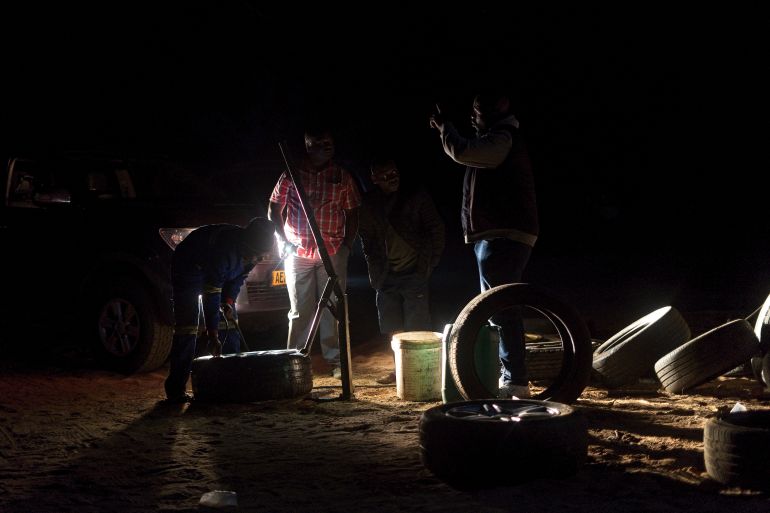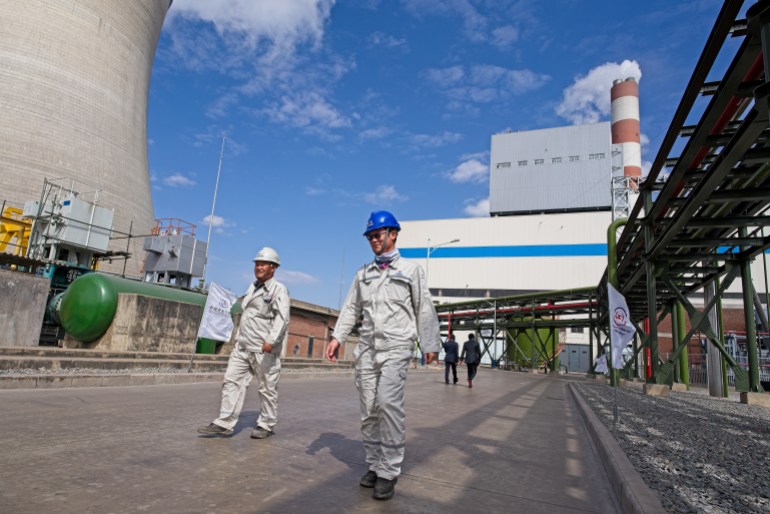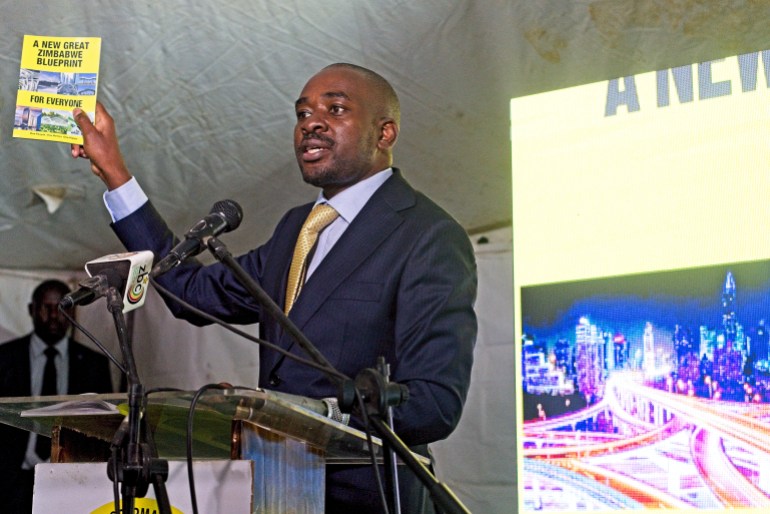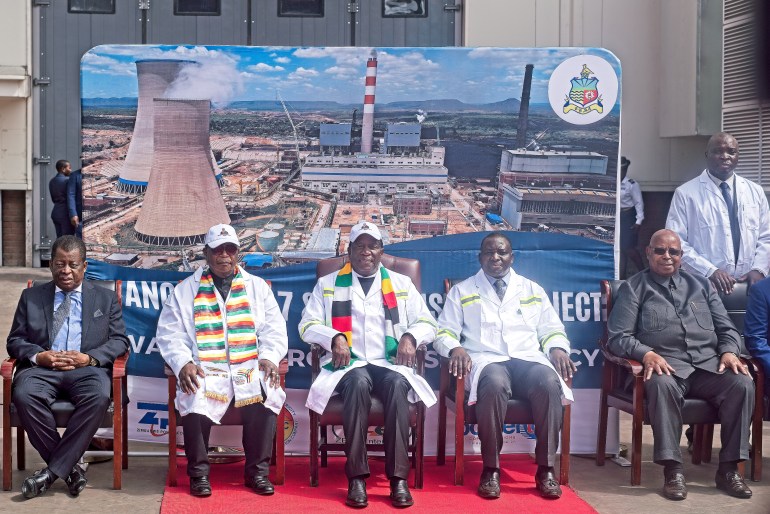‘We need power’: Zimbabweans hope for end to blackouts as election nears
For many businesses in Zimbabwe where the economy is in free fall, electricity outages have been the norm for years.

Bulawayo, Zimbabwe – At the fuel station that Emmanuel Bhuru supervises in Zimbabwe’s second industrial city of Bulawayo, electricity outages are the norm.
As the station has no functional generator, his staff now work shorter hours. For most of their 12-hour shifts, they sit around waiting for electricity to work and then leave an hour early to be able to get home before darkness descends. Perishable products often go bad in the station’s mini-mart fridges, too.
Keep reading
list of 4 itemsChina restaurant explosion caught on dashcam
‘No justification for Gaza carnage’: Nigeria Foreign Minister Yusuf Tuggar
How have Red Sea attacks by Yemen’s Houthi fighters affected companies?
“We lose a lot of perishables because of the power cuts so we’ve cut back and buy less yoghurt, polony [bologna], margarine and other things which spoil easily, and we just have to write it off as a loss because it’s not the manufacturer’s fault,” he said.
The power outages have also led to lower volumes of fuel being sold and the station has continuously failed to meet targets set by the fuel dealer. Bhuru estimates that in July, sales dropped by “close to 70 percent because the power went five to six days a week”. He hopes to have his generator repaired to stave off losses this August.
“Power can go at any time here, it’s never guaranteed and … if there is no electricity, no generator, we just have to shut the station and go home,” he told Al Jazeera.
Indeed, many small and large-scale businesses around the country have been forced to rely on alternatives as the country’s persistent power crisis has left many struggling to survive.
As the country heads to the ballot on 23 August, this energy deficit is one of the core issues at stake. President Emmerson Mnangagwa, who has been in power since 2017, is promising energy sufficiency if he is re-elected, telling crowds at his rallies that no one and no place will be left behind.
To ease the country’s energy troubles, the government recently commissioned two additional power units at the Hwange Thermal Power Station which will add 600 megawatts to the nation’s capacity. At its commissioning ceremony in August, Mnangagwa hailed the launch as a turning point for the country and said the additional energy would be a critical enabler for industrialisation.
“We are now energy sufficient,” the 80-year-old told a cheering crowd at a rally in Harare, the capital. “I used to hear complaints … but there is no more load shedding and if anyone comes complaining to say meat is rotting in their fridges, they are lying, tell them to bring their rotten meat and we will give them a new piece.”
But there has been no trickle-down effect for many.
“If there are no more power cuts, then we need to see it, not just declare it,” Bhuru chuckled.

No quick fix
The newly commissioned units will raise the national grid capacity from the present 1,400 megawatts to 2,000 megawatts. But Mnangagwa’s government says it wants to scale up to 2,500 megawatts by 2025 in order to cope with increasing demand from the mining sector.
More than half of Zimbabwe’s export earnings come from gold and platinum, however, the Zimbabwe Chamber of Mines cites unstable power supply as a key risk factor to the industry’s growth. The country usually relies on energy imports from Mozambique, South Africa and Zambia, but Zimbabwe has been disconnected due to non-payment of debts worth more than $100m to regional suppliers.
Young presidential challenger Nelson Chamisa of the Citizens Coalition for Change (CCC) has an ambitious goal of improving electricity generation to at least 6,000 megawatts by 2029. The CCC manifesto mentions raising $4.3bn to revamp power generation and reduce electricity tariffs to align with regional prices.

Currently, regular breakdowns at several thermal power stations due to old equipment and low water levels at Kariba, the country’s main hydroelectric plant, are affecting power output. Chamisa, 45, says he has a plan to raise $300m to modernise the national grid.
But Kurai Matsheza, president of the Confederation of Zimbabwe Industries (CZI), told Al Jazeera that there is no quick fix to Zimbabwe’s power problems.
“Any new capacity is welcome, but this is still far short of what we need as a country. We have drought challenges and climate change affecting the hydroelectric station and the new units at Hwange are a positive addition, but it’s not enough, we fear that power challenges will persist into the future,” he told Al Jazeera.
Matsheza explained that medium and long-term strategies were required to resolve a crisis which, amid economic challenges, added to the problems in pricing which have caused tariffs to surge.
After a 37 percent increase in April, prices doubled in July.
This has made life harder for Zimbabweans, especially in a country that, like Syria and Venezuela, has one of the highest hyperinflation rates globally.
The Zimbabwean dollar has lost more than 80 percent of its value to the US dollar since the beginning of the year. On the streets, the latter is the preferred currency of choice, but paying for electricity in the foreign currency has not made much difference to Daniel Ndlovu, a gold miner on the edge of the city.
“We’re still battling to keep things going, even if I pay in dollars, the power goes out, so I rely on my backup. Generators are a huge investment and it means constant repairs, I can’t run a mine on that so I need to find a more solid plan,” he said.
Built over five years, the Hwange expansion, the government’s largest infrastructure project ever, was financed through a concessional loan of $1.3bn from the Chinese government. It is one of four energy projects being built by Chinese contractor Sinohydro.
Ties between Beijing and Harare have strengthened over the years as the Far East ally has provided development funding and investment support.
In contrast, Western states have shunned Zimbabwe which is still beholden to sanctions imposed in the early 2000s. And international financiers such as the International Monetary Fund and the World Bank cannot give loans to Zimbabwe until the $10bn external debt is resolved.

Lights beyond the ballot
The past five years of Mnangagwa’s rule have seen the country slip deeper into a fiscal crisis and analysts warn the economy could worsen if there is no swift change in policy.
But Mnangagwa has said that if re-elected, he will transform Zimbabwe into a middle-income economy by 2030. Last year, the government announced agreements to commission 27 solar independent power producers to create solar parks generating 1.1 gigawatts by 2025, but currency volatility and unfavourable taxes have spurned investor uptake.
With the credibility of the vote key to improving international relations and attracting long-term investment, the opposition challenger Chamisa has promised to fix the ailing economy and end human rights abuses.
A tense political atmosphere has led to the death of at least one opposition supporter and dozens more have been injured in skirmishes with police or ruling party supporters. And it is a reminder of previous violence; the 2018 vote left six dead after the military opened fire on protesters.
As the nation goes to the polls looking towards a better future, citizens like Bhuru hope that results at the ballot translate to energy and development for those at the grassroots, regardless of who wins.
“I hope this election means they will hear our cries, the economy is bad. Here we need power so we can work properly, but more than that, we just need an end to this suffering,” he said.